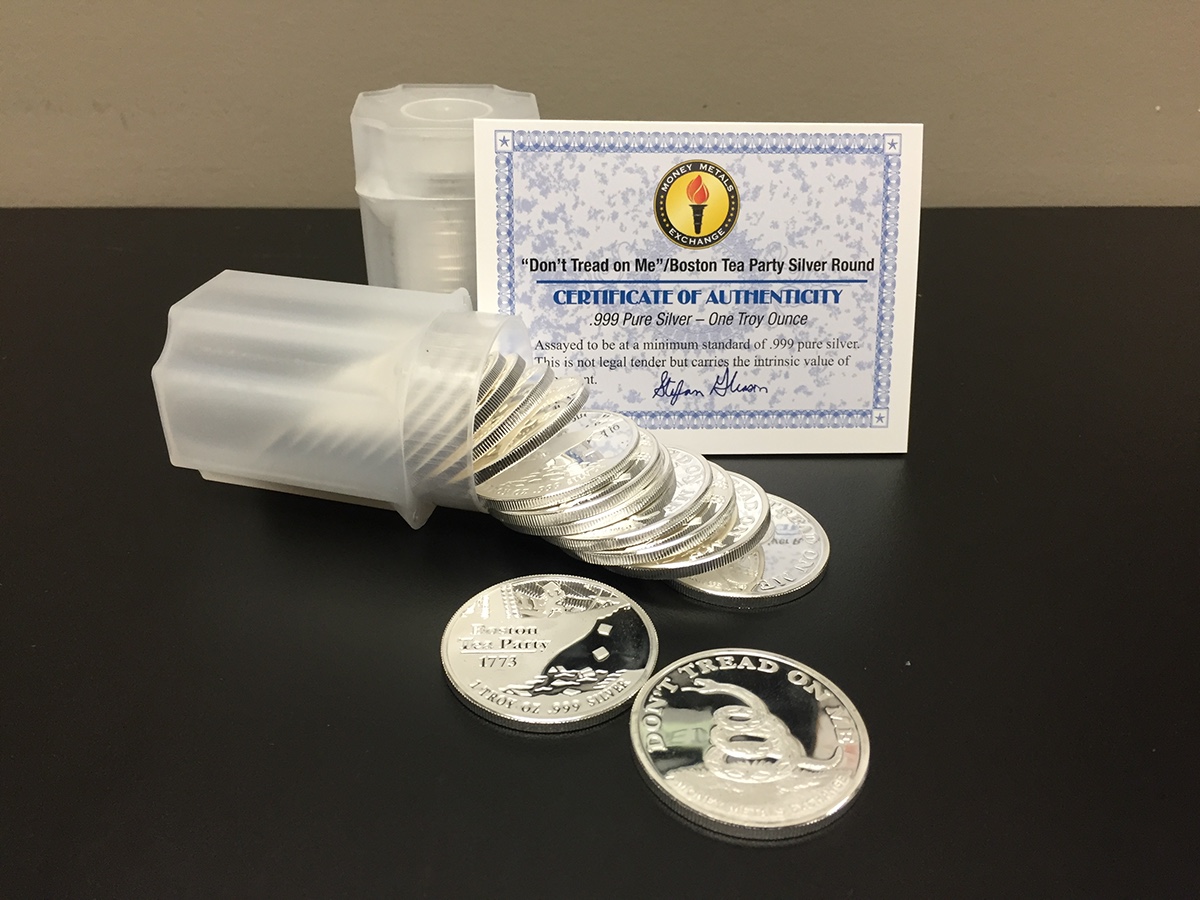Don't Tread On Me / Tea Party 1 Oz Silver Rounds

Money Metals Exchange is pleased to offer its popular "Don't Tread on Me" / Tea Party rounds, minted of .999 fine silver. While silver rounds are not legal tender, you get more silver ounces for the price than most other options. And Money Metals has the best sale prices on silver rounds found just about anywhere.
ABOUT THE DESIGN
Money Metals Exchange commissioned these beautiful 1-troy-ounce "Don't Tread On Me" Silver Coins (or "rounds") not only to provide a tool for citizens to protect against the collapse of the dollar's purchasing power, but to help reinvigorate the very symbols of Liberty upon which this nation was founded. These symbols are not to be denigrated and demonized as the highest levels of our political class are now trying to do. Instead they must be renewed, revered, and passed on to new generations who want the Founding Father's principles reasserted in modern-day America.

"Don't Tread on Me" Rattlesnake (obverse)
In 1754, Benjamin Franklin first popularized the rattlesnake as a symbol of national unity during the French and Indian War. By 1774, it had become the formal symbol of the Freedom Revolution when Paul Revere added it to the masthead of his newspaper, The Massachusetts Spy, and showed the snake fighting a British imperial Dragon. In 1775, Continental Colonel Christopher Gadsden incorporated a coiled rattlesnake with thirteen rattles (symbolizing the colonies) above the motto "Don't Tread on Me" on an early American flag.
Historians believe Franklin anonymously published the following of several arguments why the rattlesnake should be chosen as the symbol for America (rather than the eagle, which he amusingly opined was "a bird of bad moral character"). "She never begins an attack, nor, when once engaged, ever surrenders: She is therefore an emblem of magnanimity and true courage... she never wounds 'till she has generously given notice, even to her enemy, and cautioned him against the danger of treading on her."
Boston Tea Party (reverse)
In 1773, hardliners in the British government imposed a symbolic but much-hated "stamp tax" on the restive American colonies. And while the Stamp Tax was small in comparison to today's massive load of taxes imposed from Washington, it quickly became the rallying point that animated and inspired the Sons of Liberty. On December 17, 1773, after 7,000 angry colonists milled around the Boston wharf where British merchant ships were to unload imported tea, a smaller group of 200 chose to act. The Sons of Liberty, some dressed as Indians, forced their way onto three British ships and unceremoniously tossed 342 crates of tea into Boston Harbor.
This small act of clever defiance -- coupled with the rattlesnake -- became twin icons of Americans' yearning for Freedom in the face of distant, corrupt, and non-responsive government.
Benjamin Franklin's humorous but powerfully symbolic approach to tweaking officialdom is as infuriating to those who wish to control others now as it was then. The spectacle of modern-day defenders of Freedom proudly emulating and popularizing the Boston Tea Party and related symbols is deeply embarrassing to Washington, DC's ruling class.

Buy these silver rounds today:
https://www.moneymetals.com/dont-tread-on-me-boston-tea-party-silver-rounds-one-ounce/2
https://www.moneymetals.com/dont-tread-on-me-boston-tea-party-silver-rounds-one-ounce/2
